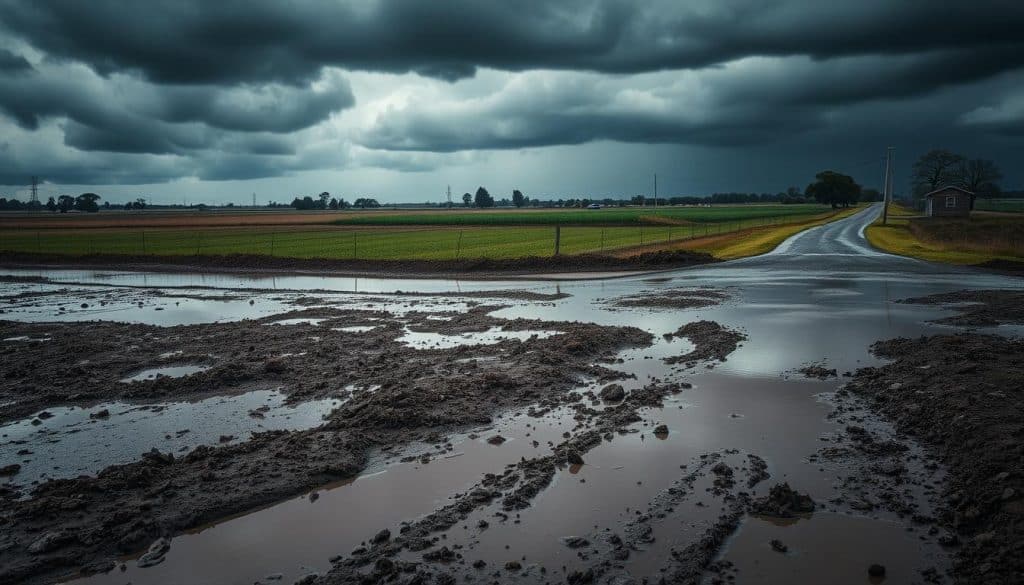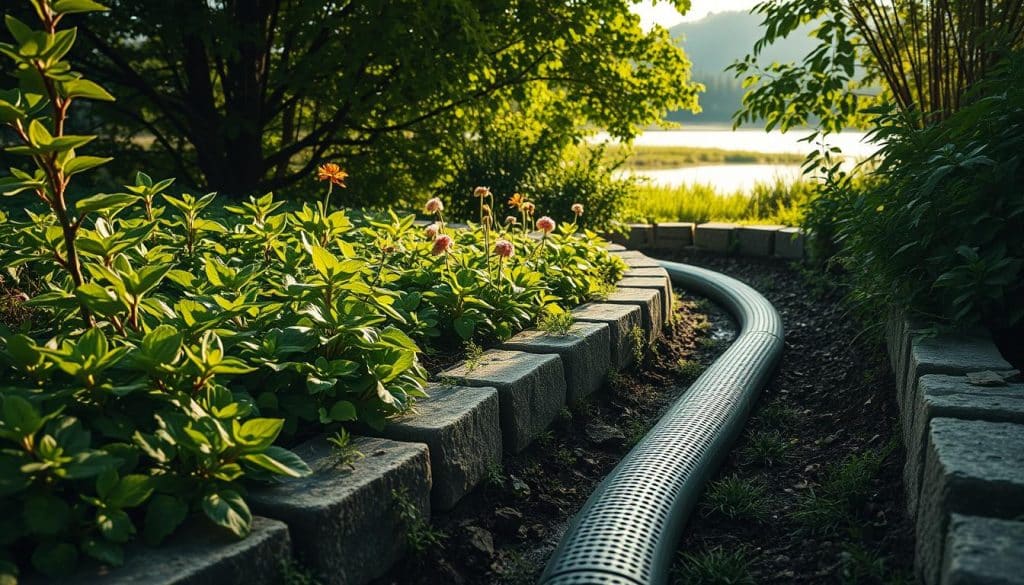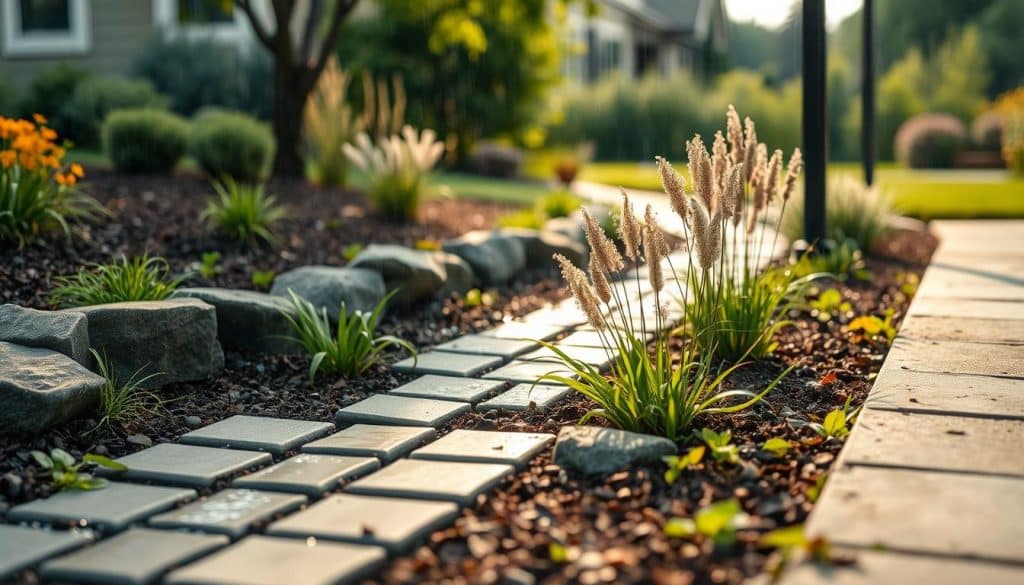Ever thought Can a French Drain Handle Heavy Rain? Or are you risking water damage to your home? It’s important to understand if a French drain can manage intense rainfall. This is key for homeowners, as many areas, like Florida, face frequent storms.
Let’s explore how French drains work, their installation needs, and if they can really handle heavy rain. We’ll look into their effectiveness in managing stormwater.
Key Takeaways
- French drains can effectively manage high volumes of water, minimizing flood risks.
- Proper installation and maintenance are essential to ensure optimal function during heavy rains.
- Regions with clay-heavy soils may face challenges when relying solely on French drains.
- Homes with adequate drainage systems are less prone to property damage from severe weather.
- Investing in French drains can enhance your property value due to reduced water damage risks.
Understanding French Drains and Their Functionality
A French drain is key in managing water around homes. It stops water damage by moving water away from foundations and gardens. Knowing how French drains work is vital for those with water problems.
What is a French Drain?
A French drain has a trench filled with gravel and a pipe at the bottom. Water flows through the gravel, and the gravel catches debris. This keeps the pipe clear.
By moving water away, a French drain prevents damage and mold. It can save homeowners a lot of money, up to $10,000, on repairs.
How Does a French Drain Work?
French drains guide water downhill, ideally at a 1% slope. When it rains, water flows into the pipe and away from the foundation. This helps solve about 30-40% of flooding problems.
Using clean stone and filter fabric makes the system better, up to 25%. With care, a French drain can last over 30 years, a smart investment for homeowners.
The Importance of Proper Drainage Systems
Homeowners often face drainage problems that can cause big issues. Knowing about these problems can help avoid bigger problems later. Water pooling, soil erosion, and foundation damage are common problems, often seen during heavy rain.
Common Drainage Problems Homeowners Face
Bad drainage can lead to flooding and unhealthy homes. It can attract pests and mold, which love damp places. Clogged subsurface drains are a big problem, made worse by soil type and erosion. Solutions like French drains can fix these issues and keep homes safe.

Consequences of Poor Drainage
Poor drainage can cause more than just trouble. Homes without good drainage systems risk foundation damage, with a 30% chance over time. Up to 40% of mold problems in homes come from too much moisture. It’s important to protect your home from these risks to keep it safe and avoid expensive fixes. A good drainage system can greatly lower the risk of water damage.
Evaluating Your Home’s Drainage Needs
It’s important to spot signs of poor drainage to keep your property safe. Look out for water pooling in your yard, soggy lawns after rain, or water in your basement. These signs can help you find the right solution, like a French drain.
Checking how water flows in your yard is key. It shows you where water problems are and if you need more help.
Signs You Need a French Drain
Water pooling in your yard often means you need better drainage. Also, look for water stains on basement walls and soil erosion near your foundation. Spotting these problems early can help avoid expensive repairs or fixing your yard.
Assessing Water Flow in Your Yard
Understanding how water moves in your yard is vital. The slope, soil type, and current drainage systems affect water flow. By looking at these, you can see if you need a French drain to handle excess water, like during heavy rain.
The Advantages of Installing a French Drain
Installing a French drain helps homeowners manage water around their properties. It prevents standing water, which can cause serious damage over time. By managing rainwater, a French drain boosts your property’s value.
Efficient Water Management
French drains efficiently move water away from homes. They help prevent moisture buildup near foundations, reducing damage risks. In areas with heavy rain, these systems keep homes dry and safe from flooding.
Long-Term Cost-Effectiveness
A French drain is a smart investment for homeowners. The cost is between $4,000 and $12,000, depending on the size and complexity. This is much less than the cost of fixing damage from untreated moisture issues.
By choosing a French drain, you save money on repairs and increase your home’s value. Homes with good drainage systems can be worth up to 20% more.
French Drains vs. Interior Drain Systems
Choosing between French drains and interior drainage systems is key for effective water management. It affects both cost and performance. Knowing the cost and how well they work in heavy rain is vital for homeowners.
Cost Comparison
French drains are often cheaper to install than interior systems. A DIY French drain can start at $1,500. Hiring pros can cost over $10,000. This shows the need to carefully consider options for long-term savings.
A dry well kit costs about $500 but requires a lot of digging. This affects both budget and practicality. French drains might be more complex to install but save money on repairs and property damage, often over $10,000.
Effectiveness in Heavy Rain
French drains are better than many interior systems in heavy rain, thanks to their design. They rely on gravity to move water, which is great for clay soils. Dry wells, on the other hand, scatter water slowly.
Both systems can handle a lot of water, but French drains are proactive. They move water away before it harms your home. This keeps your home safe and reduces repair costs from heavy rain.
When to Consider Other Solutions
French drains are great for managing water, but sometimes you need something else. Catch basins are a good choice for heavy runoff. They collect water, easing the load on your drainage system.
They’re perfect for places that flood or get a lot of rain. Knowing the benefits of catch basins can help you decide if you need them.
Catch Basins and Their Benefits
Catch basins catch debris and let clean water through. This helps prevent clogs in French drains during heavy rain. They’re a smart choice for areas with lots of runoff.
They’re good at keeping water away from your property. This makes them a favorite for managing surface water.
Downspout Drainage Options
Downspout drainage systems are another great option. They move rainwater from roofs away from your foundation. This helps prevent basement flooding and water damage around your property.
They work well with French drains to manage water flow during storms. It’s important to have good downspout drainage for heavy rain.

Maintenance and Upkeep of Your French Drain
Keeping your French drain system working well needs regular care. A good maintenance routine helps avoid clogs and keeps the system clean. It’s important to check your drainage system often and fix any problems quickly.
Regular Inspections
Check your French drains every six months. This can help prevent clogs and backups, which are common during rainy days. Look for signs like standing water or damp spots to catch issues early.
Regular checks help find problems before they get worse. This keeps your French drain working well for longer.
Cleaning and Clearing Options
Cleaning your French drain is key to its performance. You can choose to hire professionals for this, which costs between $150 and $500. Using electric sewer snakes can make cleaning faster.
Doing maintenance, like cleaning once a year, can make your drainage system last longer. It can even extend its life by up to 25%.
Foundation Repair and Water Issues
Water intrusion is a big threat to your home’s foundation. Over 60% of homeowners in flood-prone areas face water issues. These can weaken the foundation. When soil gets too wet, it can swell up to 15%, putting more pressure on the foundation.
This shows how important it is to know how water affects your home. It’s also key to get foundation repair services quickly if you see water damage.
How Water Affects Your Home’s Foundation
Foundation problems often come from bad drainage and water pooling near the foundation. Studies show homes with poor grading are three times more likely to have foundation issues. About 80% of foundation repairs are due to water problems.
So, having good drainage systems, like French drains, is vital. Waterlogged conditions can make foundation sinking 50% more likely. This makes finding solutions quickly very important.
Preventive Measures
It’s important to prevent water damage. Homeowners should keep their gutters and downspouts clean. Make sure they send water at least 5 to 10 feet away from the foundation.
Regular checks and upkeep can cut down overflow problems by 70%. This can save you from expensive repairs. Also, make sure the ground slopes away from your house by 2-3 inches over 8 feet. This helps manage water better. Taking these steps can greatly reduce the risk of foundation problems.
Choosing the Right Company for Drainage Solutions
Finding a reliable company for drainage solutions is key. It ensures your French drain system works right and stays that way. Look for a company that knows a lot about managing water, which is important in rainy areas. A good Drainage First review shows why picking a knowledgeable provider matters. They know how to find the best drainage plan for your property.
Why Drainage First is a Smart Choice
When picking a drainage provider, think about their experience, how happy customers are, and what services they offer. Drainage First has been around for over 23 years. They take a detailed look at your property to design the best drainage system. This approach means your system will last longer and save you money.
How We Can Help
Working with a pro like Drainage First brings many benefits. They know how to install systems that work well in your area. They use French drains, dry wells, and rain gardens to prevent water damage. They also give advice on keeping gutters and downspouts in good shape. This way, they make sure water is handled right across your property.
Contacting Drainage First for Assistance
If you’re dealing with drainage issues or worry about heavy rain, getting help is key. Drainage First is here to assess your needs and offer custom solutions. With the weather changing, a good drainage system is more important than ever to prevent water damage and flooding.
Schedule a Consultation
Homeowners should reach out for an assessment to tackle drainage problems early. Drainage First offers detailed consultations to understand your property’s needs. They recommend the best ways to manage water, keeping your foundation safe from damage during heavy rain.
Call Us: (678) 389-9544
For quick help and to protect your home from water, call Drainage First. Their team is ready to tackle your drainage needs with quality service. For more details, visit Drainage First contact information and protect your home now.















